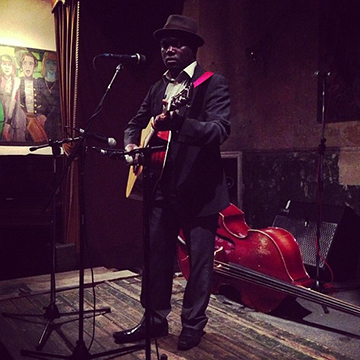 Over in London, England, there is a budding new bluesman playing the old African American deep roots blues. He’s a Nigerian émigré who has lived in London since 2011, by way of Italy, where he got his first guitar and music lessons by his supportive Italian stepfather. His real name is Olorunfemi Precious Akinmayowa, his perfect stage name is Femi Precious, a cross-cultural musician if ever there was one. You gotta love it!
Over in London, England, there is a budding new bluesman playing the old African American deep roots blues. He’s a Nigerian émigré who has lived in London since 2011, by way of Italy, where he got his first guitar and music lessons by his supportive Italian stepfather. His real name is Olorunfemi Precious Akinmayowa, his perfect stage name is Femi Precious, a cross-cultural musician if ever there was one. You gotta love it!
He started off learning on a nylon-stringed classical guitar in the music school his step-father encouraged him to attend in Italy. He then moved up to a Yamaha steel-string. Like many kids his age he got into hip-hop and rap, developed an infatuation for reggae and Bob Marley, all the while quietly digging into the 12-bar blues and slide guitar. His Italian family had drawers full of 1960s blues recording and so he connected with Albert Collins, B.B. King, Buddy Guy and John Lee Hooker. By now the lad can play and he has garnered international attention among blues fans through YouTube (Yes, social media is good for some things!). He is still working a day job, but things are looking bright for the young bard. He stated, “I believe that I am still a beginning artist. New to be known. Not yet a professional.”
But, oh, he sounds so very good! It’s time for him to get known!
So how can this happen, you wonder? His ancestry is African, his musical education Italian, his home English and his music distinctly American. First, if you consider music as the universal language, that question won’t even come up. If the question does come up, the fact is that the international cultural contribution of African American music is no longer reversible. The genie is out of the bottle. People all over the world listen to, love and play blues. They feel it to the core of their essential being, deep to their soul, no matter where they are from. Some will still claim that nobody whose ancestry did not originate from the cataclysmic African American experience of slavery, and post-slavery Jim Crow segregation, has a right to play the blues. This notion denies the fact that in music and songs, and in all of life, origin, race and ethnicity are illegitimate measure for any man or woman! Logically, people of all races and national origin can promote and contribute to a musical tradition and cultural heritage of another. Dominating cultural and artistic movements reach success beyond their origins, and eventually borders, leading to inter-cultural integration. This is cultural evolution and should be a tremendous source of pride.
The African-European bard answered the slavery question most eloquently, “Blues did not start with slavery. Blues has always been there. The slaves brought their African musical influences to America. They adapted the African beat to America. Our African music is distinctly similar, for example the call and response of work songs. Americans reconstructed the music, but the sound of the roots are those where I originally came from. The beats are similar. Lyrically, I also relate to the blues. I feel it.”
He’s the real deal, and when you hear him play his Tokai lawsuit Gibson J200, you will know it’s true. Check out his record “Femi’s Ragtime and Blues” with harmonica player & Marco Farris. You can get it on Apple and Spotify.

